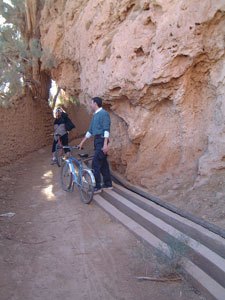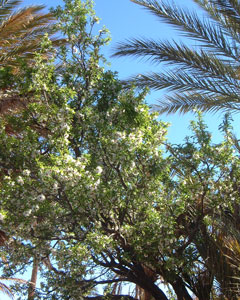|


      
|
Life
in a Desert Oasis
|
Figuig
is a desert oasis- a place of life and growth nested in a vast
expanse of dryness and death. The several water sources that
provide Figuig with its lukewarm, life-giving water make this
miracle possible. Water rights are passed on from generation
to generation, and a 45 minute weekly flow of water is enough
to cultivate a small garden of palm trees, fig trees and ever
apricots! But water is only the prerequisite: wise living and
an art for conservation also account for centuries of survival
and prosperity.
Leo
tells an amusing story about the types of ttroubles oasis dwellers
went through to accumulate all goods necessary for life and
greenery:
|
 A
complex system of water pipes brings water to every garden
A
complex system of water pipes brings water to every garden |
"
There are many fields, but the land has to be watered with water from
wells, as the region is dry, and fertilized with animal waste. This
is why locals encourage travelers to sleep in their homes, to gather
the waste from both men and their horses. The greatest offense a guest
can do his host is to go to the bathroom outside of his home. If the
host sees this he will get mad and cry out: "Have you not noticed
that there is a bathroom in my house. Why do you go outside?"
(Leo, 436)

An almond tree in the desert- a miracle of resource management |
Given
the scarcity of greenery, herding is also a challenge in such
desert Oasis. In Figuig, each family has its own small group of
sheep, and an occasional set of chickens, but they mostly rely
on the weekly souk where abundant and various goods from Oujda
land on their central plaza. In Leo's time, such reliance on the
outside world was equally crucial, and Caravans insured the transfer
of goods from rich regions like Fes to more arid ones in the South:
"Meat is very expensive (in an Oasis) because there is
very little herding in the region due to draught. There are only
a few goats used for their milk. People eat camel meat, which
they purchase from Arabs in local markets. These are the camels
that can no longer be used for travel. They also eat salty meets
imported from Fez by merchants who make a huge benefit on the
trade." (Leo, 436)
|
|